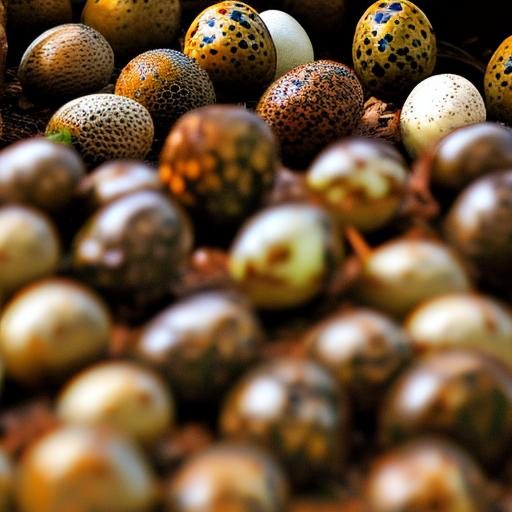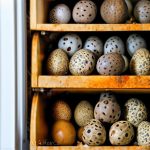Quail eggs are small, speckled eggs that come from the quail bird, a small game bird that is native to Europe, Asia, and Africa. These eggs are gaining popularity in the culinary world due to their delicate flavor and high nutritional value. Quail eggs are packed with essential nutrients such as protein, vitamins, and minerals, making them a healthy addition to any diet. They are also known for their beautiful appearance, with a unique speckled pattern on the shell that adds a touch of elegance to any dish. Quail eggs can be enjoyed in a variety of ways, from being boiled and served as a snack to being used in baking and cooking. Due to their small size, quail eggs are often considered a gourmet ingredient and are prized for their rich, creamy yolk and delicate texture. Whether you’re a food enthusiast looking to experiment with new ingredients or a health-conscious individual seeking nutritious alternatives, quail eggs are a versatile and delicious option to consider.
Quail eggs are not only known for their culinary appeal but also for their potential health benefits. They are rich in protein, which is essential for muscle growth and repair, as well as for maintaining healthy hair, skin, and nails. Quail eggs also contain important vitamins and minerals such as vitamin B12, which is crucial for nerve function and DNA production, and selenium, an antioxidant that helps protect the body from oxidative stress. Additionally, quail eggs are a good source of choline, a nutrient that supports brain health and helps regulate the nervous system. With their impressive nutritional profile and unique flavor, quail eggs have become a sought-after ingredient in the kitchen. However, like all perishable foods, quail eggs have a limited shelf life and require proper storage and handling to ensure their quality and safety.
Key Takeaways
- Quail eggs are small, nutritious, and delicate, with a unique flavor and texture.
- Factors affecting the shelf life of quail eggs include temperature, humidity, and cleanliness.
- Properly storing quail eggs in the refrigerator can extend their shelf life and maintain their quality.
- Signs of spoiled quail eggs include a foul odor, discoloration, and unusual texture.
- The shelf life of quail eggs can be extended by using methods such as pickling or preserving in oil.
Factors Affecting the Shelf Life of Quail Eggs
Several factors can affect the shelf life of quail eggs, including temperature, humidity, and handling practices. Quail eggs are more delicate than chicken eggs and have thinner shells, making them more susceptible to damage and contamination. When it comes to storage, temperature plays a crucial role in determining the freshness and longevity of quail eggs. Ideally, quail eggs should be stored at a consistent temperature of around 45 to 50 degrees Fahrenheit (7 to 10 degrees Celsius) to maintain their quality. Exposure to extreme temperatures can cause the eggs to spoil more quickly, so it’s important to store them in a cool and stable environment. Additionally, humidity levels can impact the shelf life of quail eggs, as excessive moisture can lead to bacterial growth and spoilage. It’s essential to store quail eggs in a dry environment to prevent moisture from accumulating on the shells and compromising their integrity.
In addition to environmental factors, proper handling is crucial for preserving the freshness of quail eggs. Rough handling or improper storage can lead to cracks in the shells, which can increase the risk of contamination and spoilage. It’s important to handle quail eggs with care and avoid dropping or jostling them to prevent damage. Furthermore, washing quail eggs before storage is not recommended, as this can remove the protective cuticle on the shell that helps prevent bacteria from entering the egg. By understanding the factors that affect the shelf life of quail eggs, you can take the necessary precautions to ensure that they remain fresh and safe for consumption.
Storing Quail Eggs Properly
Proper storage is essential for maintaining the quality and safety of quail eggs. When it comes to storing quail eggs, it’s important to keep them in a cool and stable environment to prevent spoilage. The ideal temperature for storing quail eggs is around 45 to 50 degrees Fahrenheit (7 to 10 degrees Celsius), which is slightly cooler than room temperature but not as cold as refrigeration. If you have a cool pantry or cellar, this can be an ideal place to store quail eggs. Alternatively, you can use a dedicated egg storage container or carton to keep the eggs protected from light and moisture. It’s important to avoid storing quail eggs near strong-smelling foods or substances, as they can absorb odors easily due to their porous shells.
In addition to temperature considerations, it’s important to handle quail eggs with care when storing them. Avoid washing quail eggs before storage, as this can remove the protective cuticle on the shell that helps prevent bacteria from entering the egg. Instead, gently wipe any visible dirt or debris off the shells with a dry cloth before placing them in storage. It’s also important to store quail eggs with the pointed end facing downward, as this can help keep the air cell at the larger end intact and maintain the freshness of the egg. By following these storage guidelines, you can help extend the shelf life of quail eggs and ensure that they remain fresh and safe for consumption.
Signs of Spoiled Quail Eggs
It’s important to be able to recognize the signs of spoiled quail eggs to avoid consuming them past their prime. When quail eggs spoil, they can develop off-putting odors, flavors, and textures that indicate they are no longer safe to eat. One of the most common signs of spoiled quail eggs is a foul or sulfurous odor coming from the egg when cracked open. Fresh quail eggs should have a clean and neutral smell, so any unusual or unpleasant odors should be cause for concern. Additionally, spoiled quail eggs may have discolored or cloudy egg whites, indicating bacterial contamination or deterioration.
Another indicator of spoiled quail eggs is the presence of mold or unusual growth on the shell or inside the egg. If you notice any green or black spots on the shell or slimy textures inside the egg when cracked open, it’s best to discard the egg immediately. Finally, spoiled quail eggs may have an off-putting flavor or texture when cooked or eaten raw. If you notice any unusual tastes or textures when consuming quail eggs, it’s best to err on the side of caution and dispose of them. By being aware of these signs of spoilage, you can ensure that you only consume fresh and safe quail eggs.
Extending the Shelf Life of Quail Eggs
There are several strategies you can use to extend the shelf life of quail eggs and keep them fresh for longer periods. One effective method is to coat the shells of quail eggs with a thin layer of mineral oil before storing them. This can help seal the pores in the shell and reduce moisture loss, which can help prolong the freshness of the eggs. To do this, simply dip a clean cloth or paper towel in mineral oil and gently rub it over the shells of the quail eggs before placing them in storage.
Another way to extend the shelf life of quail eggs is by refrigerating them if you don’t have access to a cool pantry or cellar. While refrigeration is not necessary for short-term storage, it can help prolong the freshness of quail eggs for several weeks or even months. When refrigerating quail eggs, it’s important to keep them in their original carton or container to protect them from absorbing odors and flavors from other foods in the fridge. Additionally, it’s best to store quail eggs on a shelf rather than in the door of the refrigerator, as they can be exposed to more temperature fluctuations in the door.
Using Quail Eggs Beyond the Expiration Date

If you find yourself with quail eggs that are approaching their expiration date, there are several creative ways you can use them before they spoil. One popular method is pickling quail eggs, which involves boiling them until they are hard-cooked and then marinating them in a flavorful brine solution. Pickled quail eggs can be enjoyed as a tangy and savory snack or used as a garnish for salads, charcuterie boards, and cocktails. Another option for using quail eggs beyond their expiration date is to incorporate them into baked goods such as cakes, muffins, and breads. Quail eggs can add richness and moisture to baked goods while also contributing a unique flavor and texture.
Additionally, you can use quail eggs to make homemade mayonnaise or aioli, which can be used as a creamy condiment for sandwiches, salads, and dips. Quail eggs can also be used to make custards, puddings, and ice creams, adding a luxurious touch to these classic desserts. By getting creative in the kitchen, you can make the most of quail eggs before they reach their expiration date and enjoy their unique flavor and nutritional benefits.
Making the Most of Quail Eggs
In conclusion, quail eggs are a versatile and nutritious ingredient that can add flavor and flair to a wide range of dishes. By understanding the factors that affect the shelf life of quail eggs and learning how to store them properly, you can ensure that they remain fresh and safe for consumption. By recognizing the signs of spoiled quail eggs and taking steps to extend their shelf life, you can make the most of this gourmet ingredient and enjoy its unique flavor and nutritional benefits. Whether you’re using quail eggs in traditional recipes or getting creative with new culinary creations, these small but mighty eggs are sure to make a big impression in your kitchen.
Looking to learn more about poultry care? Check out Poultry Wizard’s article on how long quail eggs keep. Understanding the shelf life of quail eggs is essential for anyone raising quails or interested in incorporating these nutritious eggs into their diet. For more valuable insights on poultry care, be sure to explore their articles on what to feed ducks and how to insulate a chicken coop.
FAQs
How long do quail eggs keep?
Quail eggs can be kept for up to 2 weeks when stored properly in the refrigerator.
What is the best way to store quail eggs?
Quail eggs should be stored in the refrigerator at a temperature of around 45-50°F (7-10°C) in their original carton or in an airtight container.
Can quail eggs be frozen for long-term storage?
Yes, quail eggs can be frozen for long-term storage. However, it is recommended to crack the eggs and remove the shells before freezing.
How can I tell if quail eggs have gone bad?
You can tell if quail eggs have gone bad by performing a float test. Place the eggs in a bowl of water – if they sink and lay flat on the bottom, they are fresh. If they stand upright or float, they are no longer fresh and should be discarded.
Are there any signs of spoilage to look for in quail eggs?
Signs of spoilage in quail eggs include a foul odor, discoloration, or a slimy texture. If you notice any of these signs, it is best to discard the eggs.
Meet Walter, the feathered-friend fanatic of Florida! Nestled in the sunshine state, Walter struts through life with his feathered companions, clucking his way to happiness. With a coop that’s fancier than a five-star hotel, he’s the Don Juan of the chicken world. When he’s not teaching his hens to do the cha-cha, you’ll find him in a heated debate with his prized rooster, Sir Clucks-a-Lot. Walter’s poultry passion is no yolk; he’s the sunny-side-up guy you never knew you needed in your flock of friends!







